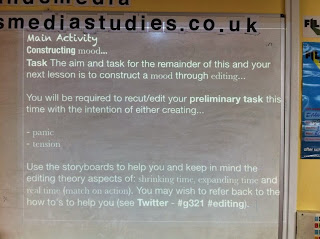Cinematic time/Real time: whether what is happening on the screen takes the same time as it would in real life, this can be completed through editing. In film time can be compressed or expressed.
Expanding time: This is when the event that is happening on the screen takes longer than it would in real life. This can be done by including less cuts, slow motion and including extra relevant shots. This is usually used in horror or thriller films.
Shrinking time: This is when what is occurring on the screen happens quicker than it would in real life. This can be achieved by including more cuts and by speeding up time. This is usually used in action films.
The first thing we had to do was to watch two clips, one from Slumdog millionaire and the other from The Bourne Ultimatum and write down some notes about how they made us feel. I felt as though the Slumdog millionaire clip made me feel sad and empathise for the characters however there was also a sense of urgency and even hope towards the end. In The Bourne Ultimatum clip there was an obvious sense of urgency, it was also intense and made me feel on the edge. Below is the notes I made in class:
Here is part of The Bourne Ultimatum clip that we watched:
Here is part of the Slumdog millionaire clip that we watched: (Watch from 16:10 - 21:50)
We then were split into two groups and given some questions which we had to answer on one of the clip each. My group was given the Slumdog Millionaire clip. The two questions that I answered were:
The first question I chose to answer was 'Are there any examples of expanding time? How does this contribute to mood?'.
In the clip there were examples of expanding time. An example of this is when the camera sequence cuts from the boys in the water, to the woman washing clothes, back to the boys and then to the mother. By including these extra shots, time has been expanded to show not only the normality of the day but the setting and characters as well.
Another example of expanding time in the clip is when the boys see the god, the shot has been put into slow motion. This is to show the importance of the god. Firstly as the god is from the opposing religion and also for the relevance of the question on the quiz show.
The second question I had to answer was: 'How does he narrative create mood?'.
The narrative creates mood as it is telling us exactly what is going on in the storyline, therefore we are enabled to feel empathy for the characters through our understanding of what is happening.
***
Next we had to use either expanding or shrinking time in our preliminary task to create a given mood. We were given panic!
- Our initial ideas were to include more cuts in the sequence as this would make it jumpy and feel as though time was going faster as you wouldn't see everything the characters were doing.
- We also decided to speed up the pace of the characters' feet walking so that it look as though they were in a hurry for what they were doing.
- Another thing we did to shrink time was to not include all of the dialogue between the two characters as this would make the audience feel more relaxed and be ale to follow the storyline perfectly. We decided to leave out some of the dialogue to also create a mysterious side to the storyline as the audience wouldn't know exactly what was occurring between the two characters.
- We also created a black out half way through the clip, when you can hear the sounds but not see anything which makes it more panicky.
- Towards he end when we watched the clip back we felt as though it still wasn't creating the right mood even though we had included all of these shrinking time techniques. Mr Lucas hinted that a soundtrack may help to create mood. We went online and found a tense, and fast paced piece of music that we could use.
Here is the clip that we edited to create the mood of panic!:



No comments:
Post a Comment